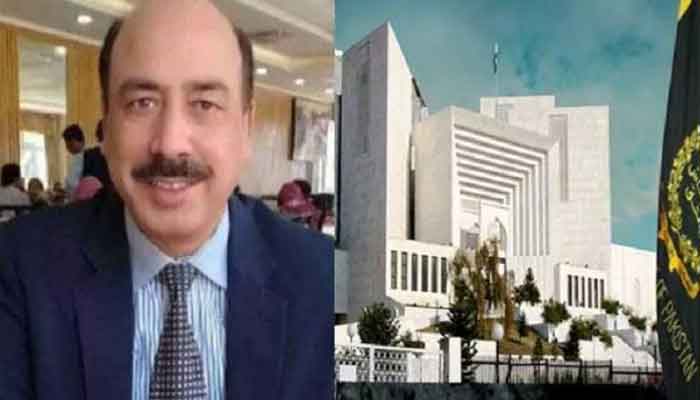Judge video scandal: Video genuineness, recorder’s evidence must to benefit Nawaz, says SC
The court scolded Judge Arshad Malik for his conduct, ruling that his sordid and disgusting conduct has made thousands of honest, upright, fair and proper judges in thecountry hang their heads in shame.
ISLAMABAD: The Supreme Court on Friday ruled that the video involving former Accountability Court Judge Arshad Malik cannot be of any legal benefit to Nawaz Sharif unless it is properly produced before the Islamabad High Court (IHC) in the pending appeal, its genuineness is established and then the same is proved in accordance with the law for it to be treated as evidence in the case.
The court scolded Judge Arshad Malik for his conduct, ruling that his sordid and disgusting conduct has made thousands of honest, upright, fair and proper judges in thecountry hang their heads in shame.
A three-member bench of the apex court headed by Chief Justice Asif Saeed Khan Khosa and comprising Justice Sheikh Azmat Saeed and Justice Umar Ata Bandyal announced judgment in the identical petitions seeking an inquiry into the controversial video involving Judge Arshad Malik.
The 25-page order authored by Chief Justice Asif Saeed Khosa held that after having been convicted and sentenced by the trial court after a full-dressed trial, an appeal filed by Nawaz Sharif against his conviction and sentence is presently pending before the IHC, and there cannot be two opinions about the legal position that it is that court alone which can at present maintain, alter or set aside such conviction and sentence on the basis of the evidence brought on record.
The court while reprimanding Judge Arshad Malik for his conduct observed that his admitted conduct emerging from that press release and the affidavit stinks and the stench of such stinking conduct has the tendency to bring bad name to the entire judiciary as an institution.
“He had unabashedly admitted in the press release and the affidavit that he had a shady past and had skeletons in his cupboard for which he was vulnerable to blackmail, during the trial being conducted by him, he had been holding private meetings with sympathisers of the accused person being tried by him, he was threatened and inducements were offered to him during the trial, but he had not reported the same to any superior authority,” the court ruled.
The court further noted that the judge had never considered recusing from the trial, after convicting the accused person in the trial, he had met the convict at his residence in a different city, he had even met a son of the convict in a different country and finally he had tried to help the convict in his appeal filed against his own judgment by dictating some grounds of appeal and pointing out some stated weaknesses in the case against the convict convicted by him.
“Such admitted conduct of the judge was shocking, to say the least, besides being abhorrent and offensive to the image of a judge in the society,” the court ruled, adding that his sordid and disgusting conduct has made thousands of honest, upright, fair and proper judges in the country hang their heads in shame.
The court noted that the Attorney General has assured the court that the said judge shall be repatriated to the Lahore High Court immediately and “we expect that after his repatriation appropriate departmental disciplinary proceedings shall be initiated against him by the LHC forthwith”.
The court held that five issues needed to be attended in the instant matters which includes:
1- Which is the court or forum that can presently attend to the relevant video for any meaningful consideration in the case of Mian Muhammad Nawaz Sharif?
2- How is the relevant video to be established as a genuine piece of evidence?
3- How is the relevant video, if established to be a genuine piece of evidence, to be proved before a court of law?
4- What is the effect of the relevant video, if established to be a genuine piece of evidence and if duly proved before the relevant court, upon the conviction of Mian Muhammad Nawaz Sharif?
5- The conduct of the judge namely Muhammad Arshad Malik in the episode.
Similarly, referring to the formation of commission, as prayed by one of the petitioners, the court observed that any commission constituted by the government or by this court, any inquiry or investigation conducted by the police or by any other agency and any probe into the matter by any other institution or body can only render an opinion in the matter of the relevant video which opinion is treated by the law as irrelevant and it cannot per se be treated as evidence for the benefit of Nawaz Sharif in his appeal pending before the IHC.
Referring to the second issue as to how is the relevant video to be established as a genuine piece of evidence, the court observed that with the advancement of science and technology it is now possible to get a forensic examination, audit or test conducted through an appropriate laboratory so as to get it ascertained as to whether an audio tape or a video is genuine or not and such examination, audit or test can also reasonably establish if such audio tape or video has been edited, doctored or tampered with or not.
“In the present case the learned judge had asserted through his press release that the conversation shown to be taking place in the above-mentioned video (the ‘subject video’) had been distorted and twisted,” the court observed. It further noted that the advancement of science and technology has now made it very convenient and easy to edit, doctor, superimpose or photoshop a voice or picture in an audio tape or video and, therefore, without a forensic examination, audit or test of an audio tape or video it is becoming more and more unsafe to rely upon the same as a piece of evidence in a court of law.
“It must never be lost sight of that the standard of proof required in a criminal case is beyond reasonable doubt and any realistic doubt about an audio tape or video not being genuine may destroy its credibility and reliability,” says the order.
Likewise, the verdict cited various judgments for proving an audio tape or video in a court of law and held that the precedents cases insists upon certain requirements including that no audio tape or video can be relied upon by a court until the same is proved to be genuine and not tampered with or doctored.
The court further held that accuracy of the recording must be proved and satisfactory evidence has to be produced so as to rule out any possibility of tampering with the record and the person recording the conversation or event has to be produced, adding that the person recording the conversation or event must produce the audio tape or video himself, the audio tape or video must be played in the court and an audio tape or video produced before a court as evidence ought to be clearly audible or viewable and the source of an audio tape or video becoming available has to be disclosed.
The court ruled that as the trial court in the case of Nawaz Sharif has already become functus officio and as his appeal against his conviction and sentence recorded by the trial court is presently pending before the IHC, therefore, the only court which can take the relevant video in evidence of that case is the IHC.
An appellate court can take additional evidence under Section 428, CrPC which provides as follows:
Appellate court may take further evidence or direct it to be taken. (1) In dealing with any appeal under this chapter, the appellate court, if it thinks additional evidence to be necessary, shall record its reasons, and may either take such evidence itself, or direct it to be taken by a Magistrate, or, when the appellate court is a high court, by a court of session or a magistrate.
Where the additional evidence is taken by the court of session or the magistrate, it or he shall certify such evidence to the appellate court, and such Court shall thereupon proceed to dispose of the appeal.
Unless the appellate court otherwise directs, the accused or his pleader shall be present when the additional evidence is taken.
Referring to the fourth issue as to what is the effect of the relevant video, if established to be a genuine piece of evidence and if duly proved before the relevant court, upon the conviction of Nawaz Sharif?, the court held that if upon due fulfilment of the preconditions mentioned in the preceding paragraphs the relevant video is taken as additional evidence by the IHC under section 428, CrPC either on its own motion or on an application submitted by the appellant namely Nawaz Sharif or any other party to the case then the High Court shall have to decide as to whether the conduct of the learned Judge of the trial court depicted through the said video, if found to be objectionable, had caused any prejudice or not.
The court observed that if the high court comes to the conclusion that the process of trial and the evidence recorded during the trial were not affected by the conduct of the judge of the trial court then the Islamabad High Court shall have the option either to reappraise the evidence itself and decide the appeal on its merits after reaching its own conclusions on the basis of the evidence available on the record or to remand the case to the trial court for re-deciding the case after hearing of arguments of the parties on the basis of the evidence already recorded.
“We would not like to comment on these aspects any further as the choices available with the High Court in the above mentioned eventualities would lie within the jurisdiction and discretion of the High Court and such choices would be exercised by it on the basis of the facts found and the conclusions reached by it,” the court held.
The court found that it may not be an appropriate stage for it to interfere in the matter of the relevant video and its effects, particularly when the said video may have relevance to a criminal appeal presently sub judice before the IHC.
The court observed that a criminal investigation is already being conducted into the matter by the Federal Investigation Agency, some other offences or illegalities under some other laws referred to by the Attorney General might also entail inquiries or investigations by the competent agencies or fora and any probe into the matter by a commission to be constituted by the government or by this court may end up only with an opinion which may have no relevance or admissibility in the relevant appeal pending before the IHC.
“In this view of the matter all these petitions are disposed of with the observations made above,” the court order concluded.
-
 Princess Eugenie Set To Hit New Milestone As Andrew's Eviction Looms
Princess Eugenie Set To Hit New Milestone As Andrew's Eviction Looms -
 Emilia Clarke Gets Honest About Featuring In Shows Like 'Game Of Thrones'
Emilia Clarke Gets Honest About Featuring In Shows Like 'Game Of Thrones' -
 Amazon Employees’ Break-time Fight Ends In Murder In Texas
Amazon Employees’ Break-time Fight Ends In Murder In Texas -
 Peter Jackson Reveals A Viggo Mortensen Mishap In 'LOTR' Fans Totally Missed
Peter Jackson Reveals A Viggo Mortensen Mishap In 'LOTR' Fans Totally Missed -
 Marsh Farm: Work Underway On Andrew Mountbatten-Windsor's New Home
Marsh Farm: Work Underway On Andrew Mountbatten-Windsor's New Home -
 'Rip' Director Dishes On Matt Damon, Ben Affleck's ‘brotherly’ Dynamic
'Rip' Director Dishes On Matt Damon, Ben Affleck's ‘brotherly’ Dynamic -
 Meghan Markle Handed Strict Warning: ‘You’re Playing With Fire In A High Risk, High Noise’ Game’
Meghan Markle Handed Strict Warning: ‘You’re Playing With Fire In A High Risk, High Noise’ Game’ -
 Paul McCartney Reveals How Close He Came To Giving Up Music
Paul McCartney Reveals How Close He Came To Giving Up Music -
 Kate Middleton’s Secret Message Decoded: ‘She’s Done With All This!’
Kate Middleton’s Secret Message Decoded: ‘She’s Done With All This!’ -
 Police Uncover Secret Cannabis Empire Ran By New York Woman
Police Uncover Secret Cannabis Empire Ran By New York Woman -
 'Euphoria' Season Three Trailer Shows Chaotic Life After High School
'Euphoria' Season Three Trailer Shows Chaotic Life After High School -
 Marisa Abela Opens Up About Impact Of Cancer Treatment On Lifestyle
Marisa Abela Opens Up About Impact Of Cancer Treatment On Lifestyle -
 Kensington Palace Shares Video Of Windsor Castle Ceremony
Kensington Palace Shares Video Of Windsor Castle Ceremony -
 Prince Harry’s Future Inheritance Causes Fears: ‘William Doesn’t Want To Support Meghan’s Ambitions’
Prince Harry’s Future Inheritance Causes Fears: ‘William Doesn’t Want To Support Meghan’s Ambitions’ -
 Gabrielle Union, 53, Delights Fans With Bold Photos
Gabrielle Union, 53, Delights Fans With Bold Photos -
 World's Biggest Fish Market Is Set To Open In Sydney: First Look Revealed
World's Biggest Fish Market Is Set To Open In Sydney: First Look Revealed




